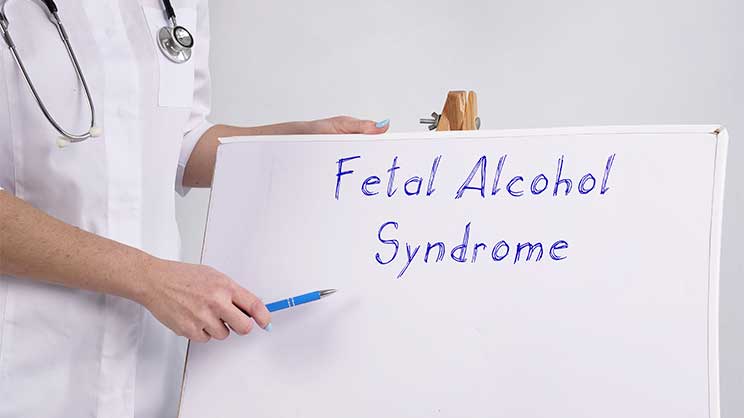If you drink any amount of alcohol while pregnant, your baby may develop a fetal alcohol spectrum disorder (FASD). These disorders occur when alcohol crosses the placenta and enters the fetus’s bloodstream, which can cause brain damage and developmental abnormalities.
The most severe type of FASD is called fetal alcohol syndrome (FAS). Here’s how this condition affects people in both childhood and adulthood.
Fetal Alcohol Syndrome
Children with FAS may experience a variety of physical, psychological, and behavioral symptoms. These symptoms can range from mild to severe, depending on the child.
Physical Symptoms
Most children with FAS experience slow growth before and after birth. They may also develop distinctive facial features, such as:
- small head circumference
- small eyes
- short, flat, upturned nose
- thin upper lip
- smooth groove between the nose and upper lip
- drooping upper eyelids
Other physical symptoms of FAS may include:
- vision problems
- hearing problems
- poor coordination
- decreased muscle tone
- deformities of the fingers, limbs, and joints
- heart defects
- kidney problems
Psychological & Behavioral Symptoms
Many kids with FAS experience developmental delays. That means they learn skills such as walking and talking at a later age than most children.
FAS can also cause psychological concerns like anxiety, impulsivity, and mood swings.
Other psychological and behavioral symptoms of FAS may include:
- memory problems
- trouble paying attention
- poor social skills
- poor problem-solving skills
- difficulty adapting to change
- intellectual disabilities
Fetal Alcohol Syndrome In Adulthood
Many FAS symptoms last into adulthood. However, some symptoms may fade over time, especially for people who receive support from loved ones and medical professionals.
In addition, some adolescents and adults with FAS develop secondary disabilities, which are conditions that can result from living with FAS. They may include:
- attention-deficit/hyperactivity disorder (ADHD)
- aggression
- anxiety
- depression
- eating disorders
- drug or alcohol abuse
According to a 2015 study, 90% of adults with FAS had mental health problems like anxiety or depression, and 60% struggled with drug or alcohol dependence.
Lifestyle Issues
The study also found that many adults with FAS have trouble leading independent lives. About 70% are unemployed, 87% have never held a regular job, and 80% need help with daily activities.
Legal Problems
Similarly, 60% of adults with FAS have experienced trouble with the law. Often, these troubles occur because many people with FAS have difficulty understanding certain laws. For instance, they might trespass because they don’t understand that some land is privately owned.
Health Risks
Some studies also suggest that adults with FAS may face a higher risk of certain diseases, including diabetes, hypertension, and cancer.
How To Support Someone With Fetal Alcohol Syndrome
There is no cure for FAS. However, with proper support, people with the condition can lead healthy, fulfilling lives.
According to the Centers for Disease Control and Prevention (CDC), children with FAS benefit from early interventions such as physical therapy, occupational therapy, and speech therapy. These services can help them avoid certain developmental delays.
Special Education
In addition, most kids with FAS struggle in traditional classrooms due to symptoms like hyperactivity and intellectual disabilities. That’s why they should receive special education tailored to their specific learning needs.
Stable Home Environment
Similarly, children with FAS are most likely to thrive when they live in stable home environments with patient, supportive caregivers. Caregivers can enroll in parent training programs that provide specific, evidence-based advice on how to support a child with FAS.
Ongoing Support
When people with FAS reach adulthood, they will need ongoing support from their families and communities. This support can reduce their risk of secondary disabilities and help them reach their full potential.
Additionally, both children and adults with FAS require support from medical professionals. Depending on their needs, these professionals may include:
- primary care providers
- audiologists
- neurologists
- nutritionists
- psychologists
- psychiatrists
Some people with FAS also benefit from holistic treatments such as meditation, yoga, and animal-assisted therapy.
How To Prevent Fetal Alcohol Syndrome
The only way to prevent FAS is to stop drinking alcohol while you are pregnant or trying to become pregnant. If you feel unable to do so, you may have alcohol use disorder (also called alcohol addiction).
This disease makes you feel unable to stop drinking even if you want to. Other symptoms may include:
- mood swings
- tolerance (needing increasingly larger or more frequent drinks to feel the desired effects)
- physical dependence (experiencing unpleasant withdrawal symptoms, such as anxiety and sweating, when you don’t drink alcohol)
- loss of interest in activities that don’t involve alcohol
If you or someone you love shows signs of alcohol use disorder, seek help at a substance abuse treatment program. Available on an inpatient or outpatient basis, these programs offer therapy, support groups, and other services to help you regain control over alcohol.
To learn more about treatment options for alcohol use disorder, please reach out to Northeast Addictions Treatment Center. Our board-certified healthcare providers offer personalized, evidence-based outpatient treatments to help you or your loved one stay sober.
Keep Reading:
- Dangers Of Taking Morphine While Pregnant
- Methadone Use During Pregnancy
- Using Dilaudid During Pregnancy
- Alcohol Addiction Causes
- Alcohol Addiction Signs
- Alcohol Addiction Treatment Options
- How Long Does Alcohol Stay In Your System?
- Is Alcohol A Drug?
- Dangers Of Drinking Alcohol Every Day
Sources:
Current Developmental Disorders Reports — What Happens When Children with Fetal Alcohol Spectrum Disorders Become Adults?
National Library of Medicine: MedlinePlus — Fetal alcohol syndrome






